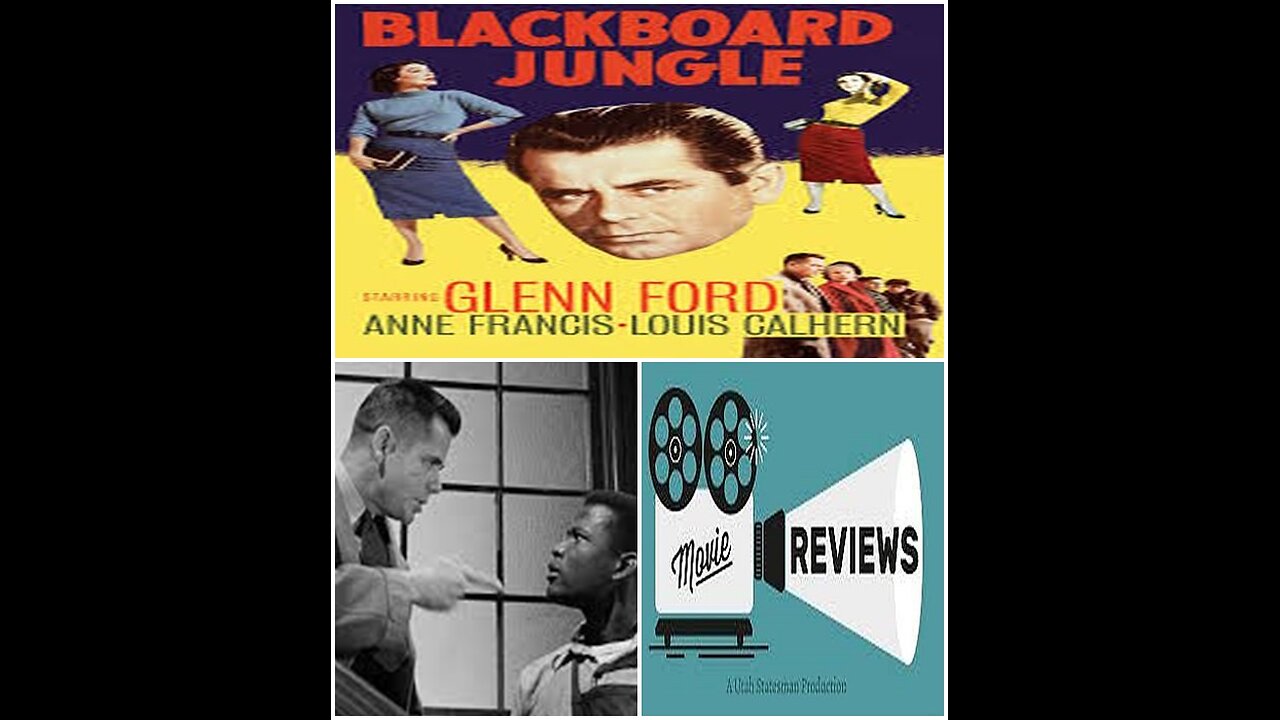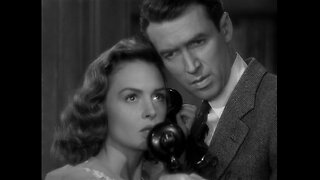Premium Only Content

Blackboard Jungle 1955 Movie Review
Blackboard Jungle
Blackboard Jungle is a 1955 American social drama film about an English teacher in an interracial inner-city school, based on the 1954 novel The Blackboard Jungle by Evan Hunter and adapted for the screen and directed by Richard Brooks. It is remembered for its innovative use of rock and roll in its soundtrack, for casting grown adults as high school teens, and for the unique breakout role of a black cast member, film icon Sidney Poitier, as a rebellious yet musically talented student.
In 2016, Blackboard Jungle was selected for preservation in the United States National Film Registry by the Library of Congress as being "culturally, historically, or aesthetically significant".[3][4]
Plot
In the mid-1950s, Richard Dadier is a new teacher at North Manual Trades High School, an inner-city school of diverse ethnic backgrounds. Led by student Gregory Miller, most engage in anti-social behavior. The school principal, Mr. Warneke, denies there are discipline issues, but the school faculty, particularly Mr. Murdock, warn Dadier otherwise. Dadier befriends two other new teachers, Joshua Edwards and Lois Hammond.
Dadier's class includes Miller and Artie West, a rebellious bully and gang leader. The class shows no respect for Dadier. Dadier encourages Miller to lead the class in the right direction. After Dadier subdues a student who attacks Miss Hammond, the class gives Dadier the silent treatment and are even more uncooperative. Dadier and Edwards are mugged by West's gang.
Reluctant to quit, Dadier seeks advice from his former teacher, Professor Kraal, the principal of an academically superior school with disciplined students. Kraal offers Dadier a job, but he declines. After chastising his class for calling each other racially divisive names, Dadier is himself falsely accused by Mr. Warneke of using racial epithets in the classroom. West encounters Dadier during his gang's robbery of a newspaper truck. West tells Dadier his classroom is on the streets and to leave him alone. Several students, led by West, assault Edwards in his classroom and destroy his music record collection.
Dadier's wife, Anne, who is pregnant, begins receiving anonymous letters and phone calls telling her Dadier and Miss Hammond are having an affair. Dadier discovers Miller can play piano and sing, and wonders why Miller can show such talent but also be so rebellious. Dadier shows his class an animated film about "Jack and the Beanstalk" which sparks discussion about moral choices. Anne goes into premature labor caused by the stress of the phone calls about Dadier's alleged affair. When a neighbor shows Dadier the anonymous letters, he angrily decides to quit. Mr. Murdock encourages him to stay, telling Dadier he is making progress and has inspired him too. Anne apologizes for doubting Dadier's loyalty in their marriage and says she was wrong for telling him to quit. Their premature baby boy, though weak, eventually thrives.
When Dadier observes West openly copying from another student, he demands that West bring his paper to the front to have it docked five points. West rebuffs his repeated request, but Dadier is unrelenting. The conflict quickly escalates, and West pulls out a switchblade. Dadier does not back down. Miller stops Belazi from jumping Dadier from behind. The rest of West's gang fails to assist.
Dadier accuses West of the false allegations made to both Mr. Warneke and Anne. Dadier subdues West, and the other students join in to subdue classmate Belazi, who has picked up the knife to escape. Miller then leads the class in helping Dadier take West and Belazi to the principal's office. In the final scene, Miller and Dadier ask if the other is quitting at the end of the school year. Miller says no, because the two of them had a pact that neither would quit if the other stayed. Dadier's expression makes clear he has no intention of breaking the agreement.
Directed by Richard Brooks
Screenplay by Richard Brooks
Based on The Blackboard Jungle
1954 novel
by Evan Hunter
Produced by Pandro S. Berman
Cinematography Russell Harlan
Edited by Ferris Webster
Music by Max C. Freedman, Jimmy DeKnight (song "Rock Around the Clock") (uncredited), Willis Holman (song "Blackboard Jungle"), Jenny Lou Carson (song "Let Me Go, Lover!"; uncredited)
Running time 101 minutes
Country United States
Language English
Budget $1,168,000[2]
Box office $8,144,000[2]
Cast
Glenn Ford as Richard Dadier
Anne Francis as Anne Dadier
Louis Calhern as Jim Murdock
Margaret Hayes as Lois Judby Hammond
John Hoyt as Mr. Warneke
Richard Kiley as Joshua Y. Edwards
Emile Meyer as Mr. Halloran
Basil Ruysdael as Professor A. R. Kraal
Warner Anderson as Dr. Bradley
Sidney Poitier as Gregory W. Miller
Vic Morrow as Artie West
Dan Terranova as Belazi
Rafael Campos as Pete V. Morales
Paul Mazursky as Emmanuel Stoker
Horace McMahon as Detective
Jamie Farr as Santini (credited as Jameel Farah)
Danny Dennis as De Lica
Cast notes:
This was the debut film for Campos, Morrow, and Farah, and one of Poitier's earliest. Farah later changed his name to Jamie Farr, best known for playing Corporal Maxwell Q. Klinger in the M*A*S*H TV series.
Factual background
Hunter's novel was based on his early job as a teacher at Bronx Vocational High School, now known as Alfred E. Smith Career and Technical Education High School in the South Bronx. Hunter, then known as Salvatore Lombino, took the teaching job in 1950 after graduating from Hunter College. He was quickly disillusioned and quit in frustration after two months.[5]
Critical reception
Positive reviews
Drive-in advertisement from 1955.
In a positive review, Bosley Crowther of The New York Times wrote:
"As a straight melodrama of juvenile violence this is a vivid and hair-raising film. Except for some incidental romance, involving the teacher and his wife and a little business about the latter having a baby, it is as hard and penetrating as a nail."
- Bosley Crowther (1955)[6]
Variety called it: "...a film with a melodramatic impact that hits hard at a contemporary problem. The casting, too, is exceptionally good."[7] Harrison's Reports called the film: "...a stark, powerful melodrama, sordid, tense, and disturbing. The picture no doubt will stir up considerable controversy, but at the same time it probably will prove to be a top box-office grosser."[8]
John McCarten of The New Yorker wrote:
"While the film has a good many faults (the acting at times is a bit shaky and the conclusion is rather unbelievable), it nevertheless confronts its subject matter head on, and in the circumstances it is an unsettling piece of work."
- John McCarten (1955)[9]
Negative reviews
Not all reviews were positive. Richard L. Coe of The Washington Post slammed the film as "so sensationalized as to negate any laudable purpose its supporters claim", further explaining:
"Yes, the papers regularly have news about shocking conditions in the schools. Vandalism certainly is more rampant than it was only a few years ago. Sex crimes and thuggery do occur. Even murder is not beyond our young. But to pile these things and more into a few months within one classroom surely does not show 'courage' on the part of the moviemakers. This approach simply is one more dodge at making a box office buck to anyone with his eyes open. This is the Dead End kids, the gangster melodrama, in another setting."
- Richard Coe (1955)[10]
The Monthly Film Bulletin delivered a mixed to negative assessment:
"Contrived situations and some rather thin characterisation reduce the impact and effectiveness of Blackboard Jungle, both as an exposé of a current American educational problem and a plea for more strenuous efforts by teachers at similar institutions. Characters such as the flirtatious woman teacher and the pregnant wife are fictitious trimmings which only emphasise the artificiality in the handling of the main theme. There are several tense and hard-hitting sequences, and a general atmosphere of strident earnestness, but only in the tiny part of the trade school headmaster, played with considerable force by John Hoyt, is there any real suggestion of complexity or depth."
- Monthly Film Bulletin (October 1955)[11]
Popular culture
The song "Rock Around the Clock" was included in the film, making the recording an anthem for rebellious 1950s youth.[12] It was Number 1 on the pop charts for two months and went to Number 3 on the R&B chart.[13]
Rotten Tomatoes gives the film a "fresh" rating of 76%. On their best of Sidney Poitier list, it says:
"This was the role that put Poitier on the map. The struggles of educators and students are well documented in this violent and controversial film, based on Evan Hunter's seminal novel about inner-city school conditions. Modern audiences might struggle to sympathize with the tactics employed by Poitier's character, Gregory Miller, but the cultural impact his performance had on both society and education are undeniable."
- Rotten Tomatoes[citation needed]
Box office
According to MGM records the film earned $5,292,000 in the US and Canada and $2,852,000 elsewhere.[2]
Awards and honors
Award Category Nominee(s) Result
Academy Awards[14][15] Best Screenplay Richard Brooks Nominated
Best Art Direction - Black-and-White Art Direction: Cedric Gibbons and Randall Duell
Set Decoration: Edwin B. Willis and Henry Grace Nominated
Best Cinematography - Black-and-White Russell Harlan Nominated
Best Film Editing Ferris Webster Nominated
Directors Guild of America Awards[16] Outstanding Directorial Achievement in Motion Pictures Richard Brooks Nominated
National Film Preservation Board National Film Registry Inducted
Writers Guild of America Awards[17] Best Written American Drama Richard Brooks Nominated
In 2010, Turner Classic Movies (TCM) listed the soundtrack of the movie on its list of the Top 15 Most Influential Movie Soundtracks of all time. TCM described the impact and the influence of the movie:
MGM brought Hollywood into the rock'n'roll era with BLACKBOARD JUNGLE. In search of the kind of music teens like the film's potential delinquents were listening to, director Richard Brooks borrowed a few records from star Glenn Ford's son Peter. When he heard Bill Haley and his Comets perform 'Rock Around the Clock', he found the perfect theme song -- the first rock song ever used in a Hollywood feature. Teens flocked to the film, dancing in theatre aisles as the song played over the opening credits. Parents may have been shocked by such uninhibited behavior, but things got worse when screenings also inspired violence and vandalism around the world. Thanks to BLACKBOARD JUNGLE, the song hit number one on the Billboard charts, eventually selling 25 million copies and becoming what Dick Clark called 'The National Anthem of Rock'n' Roll'.[18]
Cultural impact
The film marked the rock and roll revolution by featuring Bill Haley & His Comets' "Rock Around the Clock",[19] initially a B-side, over the film's opening credits (with a lengthy drum solo introduction, unlike the originally released single), as well as in the first scene, in an instrumental version in the middle of the film, and at the close of the movie, establishing that song as an instant hit. The record had been released the previous year, gaining only limited sales. But, popularized by its use in the film, "Rock Around the Clock" reached number one on the Billboard charts and remained there for eight weeks.[citation needed] In some theaters, when the film was in the first release, the song was not heard at all at the beginning of the film because rock and roll was considered a bad influence. Despite this, other instances of the song were not cut.[citation needed]
The music led to a large teenage audience for the film, and their exuberant response to it sometimes overflowed into violence and vandalism at screenings.[20] In this sense, the film has been seen as marking the start of a period of visible teenage rebellion in the latter half of the 20th century. The film was banned in Memphis, Tennessee and Atlanta, Georgia,[21] with the Atlanta Review Board claiming that it was "immoral, obscene, licentious and will adversely affect the peace, health, morals and good order of the city".[22]
The film marked[citation needed] a watershed in the United Kingdom and was originally refused a cinema certificate before being passed with heavy cuts. When shown at a south London cinema in Elephant and Castle in 1956 the teenage Teddy Boy audience began to riot, tearing up seats and dancing in the aisles.[23] After that, riots took place around the country wherever the film was shown.[24]
The 1982 crime action thriller film Class of 1984 serves as a loose remake of The Blackboard Jungle, with Perry King, Timothy Van Patten and Michael J. Fox in the roles of Glenn Ford, Vic Morrow, and Sidney Poitier, respectively.[25]
In 2007, the Journal of Criminal Justice and Popular Culture published an article that analyzed the film's connection to crime theories and juvenile delinquency.[26]
In 2015, the Journal of Transnational American Studies published a study with a focus on the film's reception in West Germany and Japan.[27]
The influential Jamaican reggae album Blackboard Jungle Dub (1973) by The Upsetters references the film's title.[citation needed]
The film touches on the still-current issue of teacher pay. The dialog states that in 1955, the pay for teachers was US$2.00 an hour (equivalent to $23 in 2023), or about US$4,000 a year salary (equivalent to $45,496 in 2023), as compared with congressmen and judges at US$9.25 (equivalent to $105 in 2023), policemen and firemen at US$2.75 (equivalent to $31 in 2023), carpenters at US$2.81 (equivalent to $32 in 2023), plumbers at US$2.97 (equivalent to $34 in 2023), and plasterers at US$3.21 an hour (equivalent to $37 in 2023).[citation needed]
In March 2005, the 50th anniversary of the release of the film, which had influenced the subsequent upsurge in the general popularity of rock and roll, was marked by a series of "Rock Is Fifty" celebrations in Los Angeles and New York City, involving the surviving members of the original Bill Haley & His Comets.[clarification needed][citation needed]
In 2016, the film was selected for preservation in the United States National Film Registry by the Library of Congress.[citation needed]
Home media
The film was released on DVD in North America on May 10, 2005, by Warner Home Video.
See also
It was a shocking movie at the time and was said to provoke violence, and when Clare Boothe Luce, then American ambassador to Italy, protested its showing at the Venice Film Festival, its international fame was assured. The subject-contempt for authority (in a metropolitan trade school)-is treated as a problem with a definite solution. Surrounded by hostile and delinquent boys, the hero, an idealistic teacher, played by Glenn Ford, tries to reach the salvageable one among them-Sidney Poitier, who gives an angry, exciting performance. (He makes you feel his tensions and heat.) The director, Richard Brooks, wrote the script, adapted from Evan Hunter's novel, and it's sane and well worked out, though it's hard for audiences to believe in the hero's courage, and not hard at all for them to believe in the apathetic cowardice of the other teachers. If you excavate Evan Hunter's short story on which the rather shoddy novel was based, it's no big surprise to find that in the original account, "To Break the Wall," the teacher did not break through. Once again, a "daring" Hollywood movie exposes social tensions-touches a nerve-and then pours on the sweet nothings. But along the melodramatic way, there are some startling episodes (and one first-rate bit of racial interchange), and recordings by Bix Beiderbecke, Stan Kenton, Bill Holman, and others set quite a pace. (The music behind the opening titles-Bill Haley and the Comets on "Rock Around the Clock"-really made people sit up.) Glenn Ford seethes all the time, but he's fairly competent. With Louis Calhern, who's always fun to watch; Margaret Hayes, as the teacher who's a candidate for rape; Anne Francis in the tiresome role of Ford's pregnant wife; Richard Kiley, as the embarrassingly weak-kneed teacher whose jazz records get smashed. Also with John Hoyt, Paul Mazursky, Emile Meyer, Horace McMahon, Warner Anderson, and Vic Morrow as the Brando-style hoodlum. Cinematography by Russell Harlan. Produced by Pandro S. Berman, for MGM.
BLACKBOARD JUNGLE (director/writer: Richard Brooks; screenwriters: from the book by Evan Hunter; cinematographer: Russell Harlan; editor: Ferris Webster; music: Charles Wolcott; cast: Glenn Ford (Richard Dadier), Anne Francis (Anne Dadier), Louis Calhern (Jim Murdock), Margaret Hayes (Lois Hammond), John Hoyt (Mr. Warneke), Richard Kiley (Joshua Y. Edwards), Sidney Poitier (Gregory W. Miller), Vic Morrow (Artie West), Dan Terranova (Belazi), Rafael Campos (Pete V. Morales), Paul Mazursky (Emmanuel Stoker); Runtime: 101; MPAA Rating: NR; producer: Pandro S. Berman; MGM; 1955)
"Tells us as much about teaching as Einstein's Theory of Relativity tells us about football."
Reviewed by Dennis Schwartz
A dreadful urban melodrama about teachers and juvenile delinquents clashing in a NYC vocational high school in the 1950s. It's based on Bronx born novelist Evan Hunter's moralistic novel about an idealistic young teacher, Richard Dadier (Glenn Ford), and his rough opening semester in a tough slum school. The author took his first name from the high school he attended--Evander Childs--and his last name from the college he attended--Hunter College. Richard Brooks is the writer-director, whose screenplay was nominated for an Oscar. Don't ask me why? I thought all the histrionics, teaching methods dropped, and over-the-top class violence were bogus. In addition the teaching atmosphere was phony and all the melodramatics were unconvincing. Though the film comes with good intentions about the nobility of the teaching profession and the hope that it's possible to teach most children, these good intentions give way to a confused look at what teaching is all about.
The film received notoriety for its use of contemporary rock music over the opening and closing credits, as Bill Haley and his Comets played "Rock Around The Clock." Its use of rock music, the first time for a major film, proved successful and started the trend to use rock music that still continues today. Otherwise this is a dated movie that has little relevance for today's world, except education is still mired with many problems and discipline is still one of its major problems. And, let's not forget teachers are still underpaid.
Married war veteran Richard Dadier gets his diploma through the G.I. Bill of Rights and begins his career as an earnest English teacher in an inner-city New York boys high school with a terrible reputation for discipline problems. He meets the bug-eyed principal Warneke (John Hoyt) who is in denial about his school having a discipline problem; the cynical veteran teacher Jim Murdock (Louis Calhern) who relates the school to a great big garbage can; the attractive bored Lois Hammond (Margaret Hayes), who nearly gets raped the first day of class; and naive math teacher Josh Edwards (Richard Kiley), who wants to teach but his rowdy students wouldn't let him. Most of the faculty feel beaten down and just go through the motions of teaching. Dadier is faced with a problem class that includes wise guy black student Greg Miller (Sidney Poitier), calling him Chief; repulsive gang leader Artie West (Vic Morrow), a surly career criminal type who sneers at the teacher and calls him "Daddy-O;" Puerto Rican class clown Morales (Rafael Campos); troublemaker Belazi (Dan Terranova), a member of West's armed robbery gang; and an assortment of other juvenile delinquent types.
Even after Dadier is jumped after school and beaten along with Edwards by his students, he is determined to do a good job and refuses to quit. He emphatically tells his pregnant wife Anne (Anne Francis): Dadier: "Yeah, I've been beaten up, but I'm not beaten. I'm not beaten, and I'm not quittin'." Edwards quits after West and his classmates destroy the teacher's valuable record collection. But Dadier hangs in, fights off charges of racism, directs the school Christmas play, and almost loses it when he learns his wife received threatening letters from his students and she gives birth prematurely.
Things get tied up in a nice neat knot as the cynical teacher learns the kids are human and can be taught, Poitier learns to believe in the system and remains in school for his senior year to pursue his talent in music, and Ford finally reaches the kids by showing them a movie and motivating them to use their imagination. Ford also has to disarm switch-blade yielding West in a classroom outbreak in order to gain respect and control of the class. But by the time that rolled around, I wouldn't have been surprised by any incident taking place in this so-called jungle environment. The film tells us as much about teaching as Einstein's Theory of Relativity tells us about football.
-
 8:50:58
8:50:58
Right Side Broadcasting Network
1 day ago🎅 LIVE: Tracking Santa on Christmas Eve 2024 NORAD Santa Tracker 🎅
329K46 -
 2:48
2:48
Steven Crowder
1 day agoCROWDER CLASSICS: What’s This? | Nightmare Before Kwanzaa (Nightmare Before Christmas Parody)
309K12 -
 33:49
33:49
Quite Frankly
1 day agoThe Christmas Eve Midnight Telethon
113K22 -
 2:12:46
2:12:46
Price of Reason
1 day agoAmber Heard BACKS Blake Lively Lawsuit Against Justin Baldoni! Is Disney CEO Bob Iger in TROUBLE?
65.1K24 -
 1:01:17
1:01:17
The StoneZONE with Roger Stone
19 hours agoChristmas Edition: Why the Panama Canal is Part of the America First Agenda | The StoneZONE
135K50 -
 18:12:15
18:12:15
LFA TV
1 day agoLFA TV CHRISTMAS EVE REPLAY
148K19 -
 13:32
13:32
Scammer Payback
21 hours agoChanging the Scammer's Desktop Background to his Location
16.8K4 -
 4:21
4:21
BIG NEM
23 hours agoNikola Tesla's Secret to Cultivating Creativity & Genius
12.5K1 -
 15:03
15:03
The Anthony Rogers Show
1 day agoAnthony Rogers - Live at Cusumano's Pizza (Upstairs)
9.98K1 -
 4:33:48
4:33:48
tacetmort3m
1 day ago🔴 LIVE - THE ZONE KEEPS PULLING ME BACK - STALKER 2 - PART 15
75K13